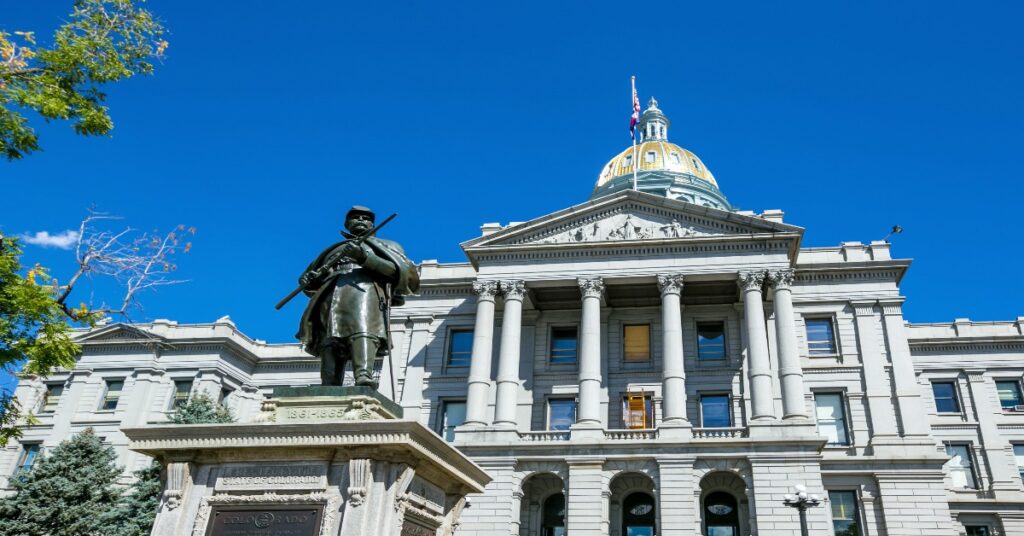Despite an increasingly bleak state revenue outlook, state lawmakers across the country continue to prioritize regressive tax cuts. Proposals to eliminate property taxes and income taxes are being floated in Florida and Georgia, respectively. Texas lawmakers continue to debate additional property tax cuts in their second special session of the year, and Ohio lawmakers are seeking to eliminate two school property tax levies by overriding the governor’s previous veto of the tax cut.
But some states are taking their uncertain fiscal conditions seriously. Oregon lawmakers are pushing for new revenue to ensure their infrastructure and public transit are funded for years to come. And Colorado lawmakers recently protected revenue in a special session by expanding combined reporting to certain offshore tax havens and decoupling from the Foreign Direct Investment Income deduction. Meanwhile, a new coalition in Colorado is working to secure progressive tax revenue by raising taxes on households with incomes over $500,000. The new ballot measure would ask those currently paying the lowest state and local tax rates to contribute more while raising more than $2 billion annually for shared priorities.
Major State Tax Proposals and Developments
- During special session, lawmakers in COLORADO passed multiple corporate tax reforms in response to a state revenue shortfall driven by the tax provision in the federal megabill. The revenue-raising reforms include extending combined reporting to regions and countries widely recognized as offshore tax havens. Lawmakers also decoupled from the Foreign Direct Investment Income (FDII) deduction which was recently expanded by the Republican megabill. Additionally, Colorado lawmakers reasonably chose to permanently disallow the state’s version of the qualified business income deduction for wealthy residents, which will raise $50 million annually. – MARCO GUZMAN
- FLORIDA Gov. Ron DeSantis is working on a proposal to cut or potentially eliminate property taxes with the hope of putting it before voters next year. A constitutional amendment to eliminate property taxes would need to be approved by 60 percent of voters. This comes as many counties in Florida have recently increased their property taxes to fund education and teacher pay raises. – NEVA BUTKUS
- GEORGIA Gov. Burt Jones — who is also running for governor — proposed eliminating Georgia’s personal income tax. Personal income taxes currently make up 41.6 percent of the state’s revenue. Lawmakers and advocates questioned the feasibility of income tax elimination, especially in the current climate as the state awaits impact assessments from the federal tax and spending bill and the shifting costs from the federal government to fund disaster relief, food assistance, and more. – NEVA BUTKUS
- The OREGON House passed a transportation funding bill to raise $4.3 billion for road maintenance and public transit after Gov. Tina Kotek called a special session to avert laying off hundreds of state employees and closing maintenance stations across the state. The bill includes increases to the state’s gas tax from 40 cents to 46 cents per gallon, increases to vehicle title and registration fees, doubling the payroll tax from 0.1 percent to 0.2 percent for the next two years, and requiring electric vehicle drivers to enroll in the state’s road usage charge program. The bill narrowly passed the House and now moves to the Senate for further action. It requires three-fifths support in both chambers to pass. – MILES TRINIDAD
State Roundup
- The grocery sales tax rate will fall to 1 percent in ALABAMA this week. The state was able to pay for it, in part, due to the sunset of the temporary income tax exemption on overtime wages, which were deemed overly expensive and ineffective.
- A new coalition effort in COLORADO is seeking a ballot measure to move the state from a flat tax to a progressive personal income tax structure. The proposal, which would take place through a constitutional amendment, would enact a 4.2 percent rate on households’ first $100,000, 4.4 percent on income over $100,001, 7.5 percent on income over $500,001, 8.5 percent on income over $750,001, and 9.5 percent on income over $1 million. The revenue would be exempt from the TABOR cap and is estimated to raise more than $2 billion annually for services like health care, education, and public safety.
- OHIO lawmakers could raise property taxes by $96 million if they succeed in overriding Gov. Mike DeWine’s veto of a provision eliminating two types of school levies, which the state partially covered through rollback credits to reimburse school districts. If the levies are axed, the rollbacks to school districts would also be eliminated.
- The MICHIGAN House passed legislation that would eliminate state income taxes on tipped income. As ITEP has documented, creating special tax breaks for tipped income is an ill-advised policy with limited benefits and major downsides.
- With NEBRASKA facing a $95 million shortfall in the two-year budget cycle that recently started, the Department of Revenue now estimates that if lawmakers don’t act to decouple from the federal megabill’s expensive and poorly targeted tax cuts, the cuts could sap another $406 million away from of state priorities over the next four years ($216 million in the current cycle alone). Meanwhile anti-tax interests in the state are pushing a ballot initiative to slash property valuation in half, with no plan for how schools and other crucial property tax-supported services would be funded.
- As a result of the federal megabill, OREGON faces nearly $900 million in lost revenue over the next biennium. The Oregon Center on Public Policy is urging the governor to call a special session to freeze the state’s conformity to the federal tax code and prevent unnecessary lost revenue.
- Lawmakers in TEXAS hit an impasse during their second special session focused partially on property tax cuts. A bipartisan group of House members voted down a conference committee report that would have lowered the voter-approved tax rate from 3.5 to 2.5 percent on taxing entities with populations over 75,000 people. Opponents argue the legislation does nothing to stop rising property tax bills.
- UTAH Gov. Spencer Cox signed legislation that creates a sales tax exemption for facility operators that manufacture energy storage devices or equipment.
What We’re Reading
- Rolling Stone helpfully reviews the literature on millionaire tax flight, reinforcing yet again that progressive taxes do not significantly affect where people live and move.
- Bloomberg published an analysis of Florida Gov. DeSantis’ political use of the state’s DOGE to generate support for eliminating the property tax.
- After Shell received a $1.65 billion tax break from Pennsylvania in 2012 that could last 25 years to entice the company to build a new petrochemical plant, Shell announced that it is now looking to sell the plant as the estimated boon of 20,000 new, permanent jobs failed to materialize.
- The Montana Free Press boils property taxes in the state down to a single stylized town called Exampleville to colorfully illustrate how different people and entities contribute to the funding pool and how the rise in property values and vacation homes has changed the balance in Montana.
- The Tennessee Lookout lays out the shift towards making working-class families finance the government instead of corporations in Tennessee. With no broad-based income tax and years of cuts to their corporate taxes, the state now has some of the nation’s highest taxes on groceries and lowest on corporations.
If you like what you are seeing in the Rundown (or even if you don’t) please send any feedback or tips for future posts to Aidan Davis at [email protected]. Click here to sign up to receive the Rundown via email.





